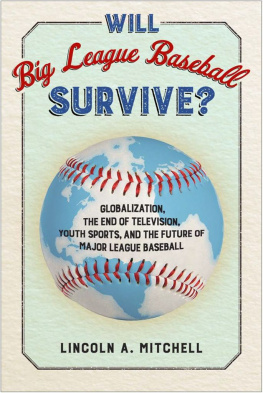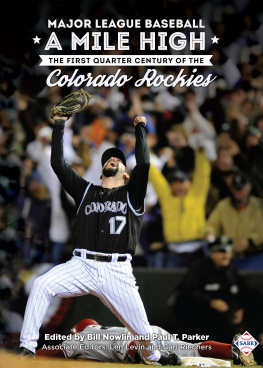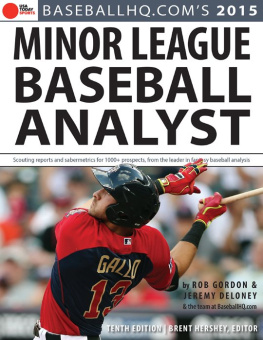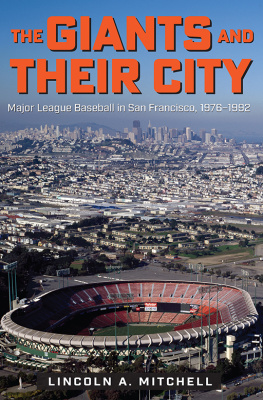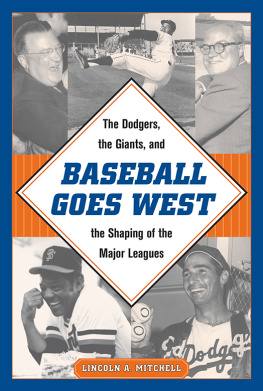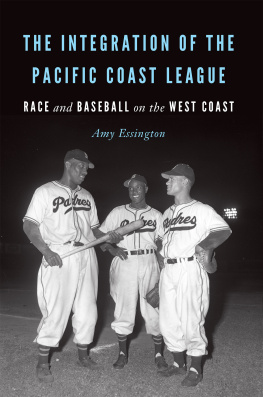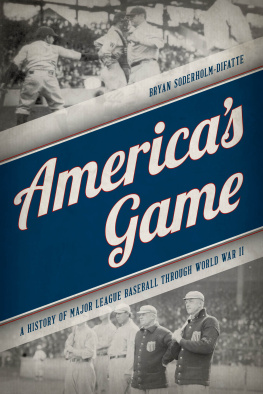WILL
BIG LEAGUE BASEBALL
SURVIVE?
LINCOLN A. MITCHELL
WILL
BIG LEAGUE BASEBALL
SURVIVE?
Globalization, the End of Television, Youth Sports, and the Future of Major League Baseball

TEMPLE UNIVERSITY PRESS
Philadelphia, Pennsylvania 19122
www.temple.edu/tempress
Copyright 2017 by Lincoln A. Mitchell
All rights reserved
Published 2017
Library of Congress Cataloging-in-Publication Data
Names: Mitchell, Lincoln Abraham, author.
Title: Will big league baseball survive? : globalization, the end of television, youth sports, and the future of major league baseball / Lincoln A. Mitchell.
Description: Philadelphia : Temple University Press, 2017. | Includes bibliographical references.
Identifiers: LCCN 2016022125 | LCCN 2016037572 (ebook) | ISBN 9781439913789 | ISBN 9781439913796 | ISBN 9781439913802 (E-book)
Subjects: LCSH: BaseballUnited States. | BaseballSocial aspectsUnited States. | Major League Baseball (Organization)
Classification: LCC GV863.A1 M56 2017 | LCC GV863.A1 (ebook) | DDC 796.357/64dc23
LC record available at https://lccn.loc.gov/2016022125
9 8 7 6 5 4 3 2 1
In memory of my brother,
Jonathan Mitchell
CONTENTS
PREFACE
The Future of Big League Baseball
M ajor League Baseball has been part of the fabric of American life for more than a century. Although big league baseball has changed, it has also remained constant in many ways over the past 120 years or so. For example, of the thirty major league teams today, ten are the same teams playing in the same cities as they did in 1903, the year of the first World Series. Field dimensions, the ninety feet between bases and the sixty feet six inches from home plate to the pitchers mound, have remained unchanged for well over a century. Baseball terms, such as can of corn for a soft fly ball or iron man for a player who shows unusual durability, are remnants from a very different America. For decades, Take Me Out to the Ballgame has been perhaps the most universally recognized secular American song.
Big league baseball is steeped in its past, creating a strong sense of continuity in the sport. Following the 2014 World Series, for example, in which San Francisco Giants ace Madison Bumgarner dominated, playing a huge role in carrying his team to victory, knowledgeable fans compared Bumgarners feat not just to the pitching performances of Sandy Koufax, Bob Gibson, and other World Series greats of the postwar era but, indeed, to the 1905 accomplish In 2015, when Ichiro Suzukis hit total for the United States and Japan reached 4,192, baseball fans recognized that, in some respects, he had tied the total number of hits by Ty Cobb, who played his last game in 1928. That record had been broken by Pete Rose in 1985. In 1995, the baseball world celebrated when Cal Ripken played in his 2,131st consecutive game, breaking a record Lou Gehrig had set in 1939.
Because of this continuity in big league baseball, it is easy to assume that its basic constructhighly paid ballplayers who are the best the world has to offer, who are drawn from everywhere baseball is played, and who play in front of large live audiences in games that are broadcast far and widehas been in place for a long time and will stay that way for the foreseeable future. The truth, however, is a bit more complicated. For much of the twentieth century, the major leagues were only one of the forums where elite-level baseball involving the best players in the country was played. Moreover, during much of this time, there were competing leagues, some of which were more formally structured than others, inside and outside the United States, and ballplayers earned modest salaries while frequently playing in largely empty stadiums.
The primary question posed in this bookwhether big league baseball will survive for more than another decade or twoasks specifically whether big league baseball will continue in its current form as a huge global and lucrative business offering a monopoly, in the United States and Canada, on the best baseball played anywhere in the world. The questions of whether big league baseball will survive and whether baseball itself will survive are two distinctly different issues. If big league baseball disappears or changes dramatically, professional baseball will still likely be played in the United States at a reasonably high level, but it may be organized very differently. Similarly, regardless of the fate of Major League Baseball, the game itself will not disappear from American culture more broadly. People will still watch it, and even play it, but the numbers of people who do that and the structures through which these activities occur will evolve.
Major League Baseball in its current form is a product of the economic, social, and media structures that have evolved in the United States over the past century or more. These structures are changing, and these changes may begin to have a more substantial impact on big league baseball. Thus far in the twenty-first century, baseball appears to be weathering these developments well, but the challenges are real.
Although the terms Major League Baseball and big league baseball are frequently used interchangeably, they do not have quite the same meaning. Big league is a general term that has long referred to baseball at its highest and most visible level. Major League Baseball, usually shortened to MLB in recent years, is the brand that is associated with big league baseball. The term big league has long been part of colloquial American English, referring to a competitive and intense level in any field. Demanding and high-stakes workplaces and prestigious firms of all kinds are at times referred to as the big leagues, but almost never as the Major Leagues.
The survival of big league baseball in anything close to its early twenty-first-century iteration is inextricably connected to the survival of the MLB brand. But that may not have always been true. During the late nineteenth century and even into the early twentieth century, the National and the American Leagues did not yet have a monopoly on big league ball, even among white players in North America. Today, however, the fates of big league baseball and MLB are unavoidably linked.
This book examines how not only changes that are directly related to baseball (including how youth sports work in the United States today) and the increased globalization of the game but also broader societal trends (including developments in media consumption and the changing nature of celebrity) will affect big league baseball over the next few decades. The study also proposes several possible scenarios for what big league baseball might look like in its next iteration.
Analysis, Not Kvetchiness
The notion that baseball is dying has probably been around as long as baseball itself, but it has been particularly persistent since about 1960. During spring training or during the play-offs, and frequently during the times in between as well, it is easy to find articles, blogs, and reports purporting that baseball is no longer the leading American pastime and will soon be replaced by soccer, football, or something else. In 2015, Bret Smiley wrote, Declaring that baseball is dying is as much an American pastime as the game of baseball itself.
In the first decade of the twentieth century, no less an American icon than Mark Twain explained why he found baseball boring and confusing:
Nine men that had their calves clothed in red did strive against other nine that had blue hose upon their calves. Certain of those in blue stood at distances, one from another, stooping, each with his palms upon his knees, watching; these they called Basemen and Fielderswherefore, God knoweth. It concerneth me not to know, neither to care. One with red legs stood wagging a club about his head, which from time to time he struck upon the ground, then wagged he it again.
Next page
